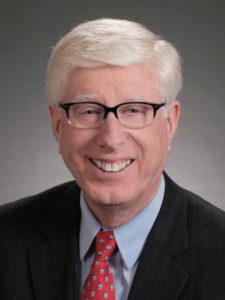Authors

The NAAG Presidential Summit, hosted by NAAG President and Iowa Attorney General Tom Miller, was held on August 9th and 10th in Des Moines. The Summit’s theme was Consumer Protection 2.0: Tech Threats and Tools. The Summit attracted 175 attendees from attorney general offices, federal agencies, and the private and non-profit sectors. Attendees enjoyed unseasonably cool Iowa weather and many informative panels addressing emergent and important technology-related issues affecting U.S. consumers as highlighted below. A recording of conference panels is available at this link on the NAAG website.
Opening and Welcome
Attorney General Tom Miller welcomed attendees to Des Moines and opened the Presidential Summit by emphasizing that consumer protection and technology are priorities for NAAG and highlighting NAAG’s new Center on Cyber and Technology. He also discussed how NAAG can help attorneys general all over the country by being a resource and facilitating important multistate cases and meetings, including the Summit. As President of NAAG, Miller has prioritized increasing cohesion among members through balanced meeting agendas, structural changes within the organization to increase bipartisanship, transparency, and collaboration.
FTC Commissioner Alvaro Bedoya
The Summit’s first speaker was Commissioner Alvaro Bedoya of the Federal Trade Commission (FTC). Commissioner Bedoya encouraged the attendees to continue to think about those who may be left behind by the new innovations in technology and privacy, including non-native English speakers, younger people, older consumers, and other vulnerable populations. He noted that while studies showing a relationship between mental health struggles among young people and the use of social media tend to be correlational in nature, there is enough information from those studies that the government needs to investigate further to determine whether social media is a causal factor. Beyond that, Commissioner Bedoya advocated that any company that retains or collects sensitive user data must think about its users, why the company is collecting the data, and how it is going to use the data.
Internet of Things and Threats: Latest Developments in IoT
The first panel, moderated by Oklahoma Attorney General John O’Connor, explored the Internet of Things (IoT), an interrelated network of devices that are connected to the internet and interact with the physical world. Doug Jacobson, Professor of Engineering at Iowa State University, provided a technical explanation of the IoT and explained how IoT devices can be used as a tool to track the public. Chris Suarez of Steptoe & Johnson added to the conversation by explaining that, notwithstanding the risks, the uses of IoT devices in the healthcare realm, such as use of smartwatches to monitor heartrates, can bring many benefits. Professor Thaddeus Hoffmeister from the University of Dayton School of Law reminded the attendees that labeling and consumer education is vital in addressing the current and upcoming issues surrounding the IoT.
The Changing Landscape of State and Federal Data Privacy Law
Colorado Assistant Attorney General Dalia Ritvo led an interactive panel on the changing landscape of state and federal privacy law. Panelists Christopher Calabrese of Microsoft, Dena Castricone of DMC Law, Dominque Shelton Leipzig of Mayer Brown, and Utah Deputy Attorney General David Sonnenreich, compared and contrasted features of the Connecticut, Utah, Colorado, Virginia, California, and European data protection laws, including the scope of the right to correct erroneous information and the so-called, “right to be forgotten.” The session concluded with a discussion of the proposed federal privacy bill, the American Data Privacy and Protection Act.
Artificial Intelligence and the Consumer Marketplace
Oregon Attorney General Ellen Rosenblum moderated a panel that critically examined how the use of artificial intelligence affects the consumer marketplace and AI’s ramifications in the fields of criminal justice, civil rights, and consumer protection. The panel featured Josh Diamond, Deputy Attorney General in Vermont, and Michael Zimmer, Associate Professor and Director of the Center for Data, Ethics, and Society at Marquette University. After a broad overview of the use of algorithms in a host of business services and products, the panelists addressed issues that arise in algorithm-based hiring processes, which may be vulnerable to manipulation and biases, as well as litigation involving AI services. The panel noted that discrete issues like notice, right to explanation, and consent are at the center of legislative debates and litigation.
The Right to Repair: If It’s Broke, Can I Fix It?
Iowa Deputy Attorney General Jessica Whitney moderated a panel on the right to repair that brought together speakers from three distinct backgrounds. It began with Gay Gordon-Byrne, executive director of the Digital Right to Repair Association, who advocated that consumers should have access to the tools and manuals needed to fix items they purchase. Rick Brenner, President of Product Safety Advisors, took an opposing approach, contending that certain items, especially those containing lithium-ion batteries, should be repaired by the manufacturer because it is too dangerous for consumers to do themselves. Christine Todaro, an attorney at the FTC, added a government perspective, discussing the FTC’s 2021 “Nix the Fix” report as well as recent litigation the agency has filed, and encouraging submission of consumer right-to-repair complaints to the Commission.
A Holistic View of Blockchain: Understanding the Non-Financial Applications, and the Latest Developments in Cryptocurrency
Connecticut Attorney General William Tong moderated a lively discussion regarding blockchain that focused on potential beneficial uses as well as negative impacts. Professor Michele Benedetto Neitz of Golden Gate University School of Law started the session with a technical introduction to blockchain and discussed examples of blockchain use for social good, including supply chains, historical record preservation, and municipal bonds. Lee Reiners, Executive Director of the Global Financial Markets Center at Duke Law School, transitioned into the latest developments in cryptocurrency, focusing on severe negative impacts related to the misuse of cryptocurrency by criminals as well as the environmental and climate consequences from crypto mining. These consequences have led to proposed legislation in New York to impose a moratorium on crypto mining. The two panelists debated the utility of blockchain relative to these societal costs and discussed the government’s role in regulating this new technology.
Keynote Speaker Frances Haugen
Frances Haugen, former Facebook (Meta) employee, and whistleblower concluded the program on Tuesday with the keynote address. She advocated for a duty of care online and from social media companies. She expressed her concern that these companies prioritized making money at the expense of harm to others, especially children. However, she noted, harming children does not have to be the default option for these companies and there are ways to hold social media companies accountable while protecting children.
Fireside Chat with FTC Commissioner Noah Phillips
Wednesday’s program began with a fireside chat between Nebraska Attorney General Doug Peterson and FTC Commissioner Noah Phillips. Commissioner Phillips discussed the relationship between the FTC and state attorneys general, observing that they share a common goal: to find bad actors. In order to go after these bad actors, the FTC and states will, at times, need to coordinate and focus their respective efforts. Commissioner Phillips also discussed several other topics, including children’s privacy online and FTC and state opportunities for collaboration, such as in the review of hospital mergers.
The Relationship Between the Aging brain and Susceptibility to Scams
Dr. Natalie Denburg, Associate Professor of Neurology at the University of Iowa, discussed the relationship between the aging brain and susceptibility to scams. Dr. Denburg’s presentation explored how cognitive impairment and diseases can affect older consumers’ memory and executive function. Those changes negatively impact their ability to navigate financial transactions and new environments and make them easy targets for scammers. Her research comparing responses to deceptive and non-deceptive messaging revealed that a segment of older people without any obvious impairment were most susceptible to deceptive advertising.
Kids and Emerging Technologies
The final panel addressed technology’s impact on children. Josh Golin from Fairplay described the many ways in which social media companies profit from harmful content directed to young people. For example, some companies seek to maximize user engagement and advertising activity on channels which attract young people with suicidal tendencies or eating disorders. According to Girard Kelly of Common Sense Media, the data collection problem of social media is intensified by the popularization of virtual reality devices, which can collect sensitive biometric data for commercial purposes without special protection for children. On a promising note, Brian McMath, Consumer Protection chief in the New Mexico Attorney General’s Office, explained the state’s settlement with Google involving children’s privacy and consumer protection laws that featured Google’s commitment to police developers that mislabel child-directed apps to ensure they do not collect information from children under the age of 13.
Lunch with CFPB Director Rohit Chopra
Consumer Financial Protection Bureau Director Rohit Chopra concluded the Summit with a speech urging collaboration between state and federal government agencies. He discussed how modern digital marketing has changed traditional advertising, banking, and consumer credit in significant ways, presenting new challenges for enforcers to address. Director Chopra unveiled a new interpretive rule identifying when digital marketers for financial firms must comply with federal consumer protection law and stating that the CFPB, states and other enforcers can sue for violation of the rule. More about this rule can be found here: CFPB Warns that Digital Marketing Providers Must Comply with Federal Consumer Finance Protections | Consumer Financial Protection Bureau.
Conclusion
The NAAG 2022 Presidential Summit provided attendees the opportunity to learn about legal and societal issues that arise alongside the advent of the new and novel technologies that are shaping our lives. From consumers’ ability to fix their own device to issues of privacy that arise in the use of virtual reality headsets, panelists addressed a myriad of important issues and provided thought-provoking and useful insights about the rapidly expanding role of digital technology as part of Attorney General Miller’s Consumer Protection 2.0: Tech Threats and Tools initiative. Armed with this information attorneys general, alongside federal law enforcement partners, scholars, and other stakeholders, can continue to serve consumers as they tackle the new challenges of the digital world.
Other articles in this edition include:
- Consumer Chief of the Month
- Attorney General Consumer Protection News: August 2022
- Federal Consumer Protection News: August 2022






